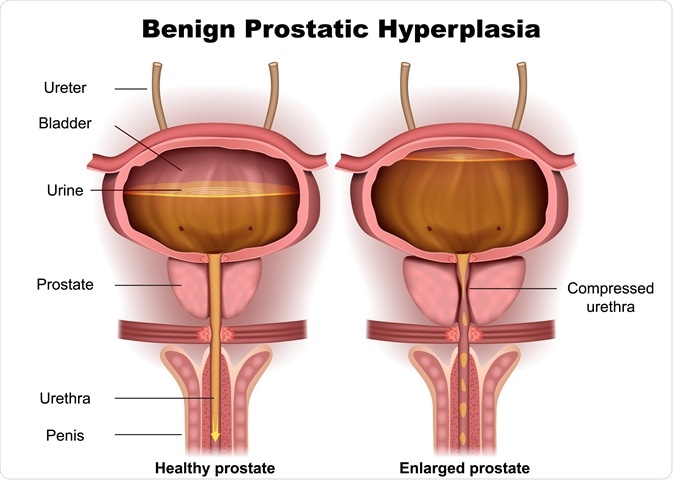Benign prostatic hyperplasia (BPH) is the term used to describe a non-malignant overgrowth of the prostate gland. Specifically, the proliferation of the epithelial and smooth muscle cells in the prostatic transition zone gives rise to this enlargement. The cause of the condition is thought to involve the male sex hormones.
 Image Credit: medicalstocks/Shutterstock.com
Image Credit: medicalstocks/Shutterstock.com
BPH is a progressive condition that usually affects men aged over 40. Estimates suggest that more than half of men aged 60 years or older and up to 90% of those aged between 70 and 80 years have lower urinary tract symptoms (LUTS) associated with BPH. These symptoms have a significant impact on the quality of life in around half of these men.
The prostate gland is about the size of a chestnut and lies just underneath the urinary bladder and against the front wall of the rectum, where it surrounds the top of the urethra. This means that when the prostate gland is enlarged due to BPH, it may press on these surrounding structures and cause the LUTS associated with the condition.
Many men with BPH may experience mild or even no symptoms. However, in symptomatic cases, individuals may experience the following LUTS:
- Increased urinary frequency and urgency due to incomplete voiding and refilling of the bladder
- Decreased force of urinary stream that causes intermittency and hesitancy while urinating
- A sensation of incomplete emptying
- Terminal dribbling
In more serious cases of BPH, there may be:
- Overflow incontinence
- Acute urinary retention
- Nocturia
- Congestion of veins in the prostatic urethra due to straining. This can cause the veins to rupture and bleed, giving rise to hematuria.
- Vasovagal syncope or loss of consciousness if straining affects the autonomic nervous system
- Straining can also cause dilation of hemorrhoidal veins or hernias.
- Incomplete voiding can cause stasis and predispose to infection and the formation of stones.
- Prolonged obstruction can cause a stretching and swelling of the kidneys referred to as hydroonephrosis, which can impair kidney function.
In cases where complete urinary retention occurs, there may be distension of the bladder and abdominal discomfort. Retention may occur due to any of the following:
- The use of anesthetic, sympathomimetics or anticholinergics
- The use of opioids or alcohol
- Prolonged efforts to delay voiding
- Exposure to the cold
- Immobilization
Symptom assessment
So that doctors can monitor symptoms, they are measured and scored using tools such as the 7-question American Urological Association Symptom Score. A score of more than 8 but less than 20 suggests the patient has moderate symptoms, while a score of 20 or higher indicates severe symptoms.
A digital rectal examination usually reveals an enlarged and hardened prostate gland that is rubbery in consistency. However, the size of the prostate gland, as detected using the finger, can be misleading because a seemingly small prostate can still cause obstruction. If the bladder is distended, this may be detectable during an abdominal examination.
Benign Prostatic Hyperplasia
References
Further Reading
Last Updated: Nov 27, 2022